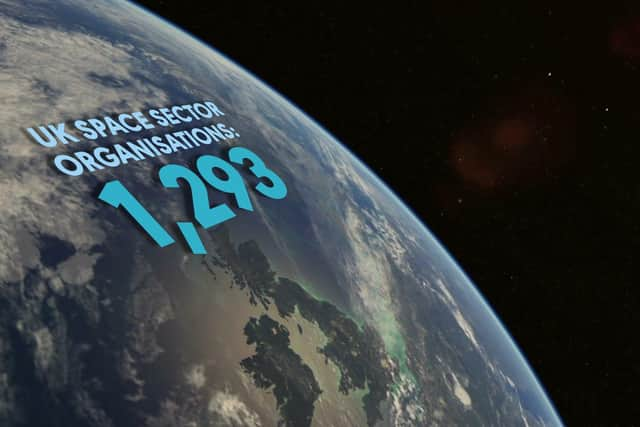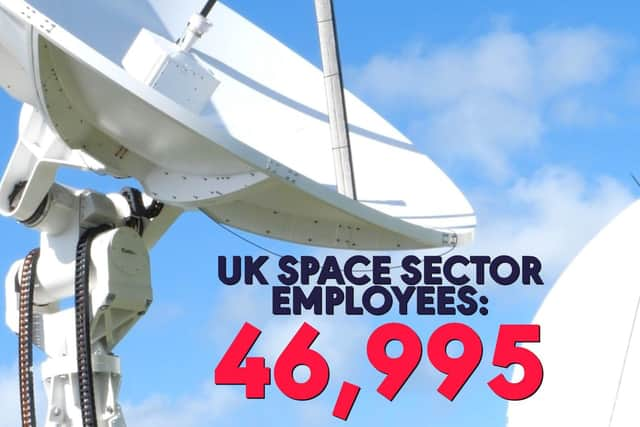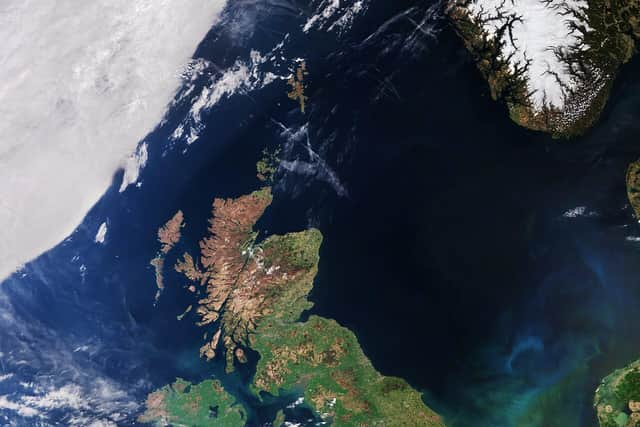Northern Ireland space jobs triple as sector employment grows across the UK
and live on Freeview channel 276
Space jobs in Northern Ireland have more than tripled in the last financial year, according to new figures released by the UK Space Agency.
Employment in Northern Ireland’s space sector grew by 318, rising from 113 in 2019 to 431 in 2020.
Advertisement
Hide AdAdvertisement
Hide AdThere are now 1,293 space organisations located across the UK and plans for spaceports are likely to increase jobs in the coming years, alongside the growth of regional space clusters, international investment, and emerging technologies, such as in-space manufacturing and debris removal, supported by the National Space Strategy.


Despite the global impacts of the Covid-19 pandemic, employment across the wider UK space sector reached 46,995 in 2020, up from 44,040 in 2019, an increase of 2,955 (6.7%).
Overall sector income increased in nominal terms from £16.4 billion to £16.5 billion in 2020. Space manufacturing, including satellites, spacecraft, launch vehicles and scientific instruments, grew the most in real terms; up by £23 million to £2.27 billion.
Following the UK Government’s commitment to increasing public and private R&D spending, investment in research and development saw a 19% boost to £836 million.
Advertisement
Hide AdAdvertisement
Hide AdSecretary of State for Northern Ireland Brandon Lewis, said: “Northern Ireland’s strong track record in aerospace, defence, cybersecurity and data analytics means that it is uniquely positioned to capitalise on new opportunities presented by the UK’s ambitions to develop a strong, vibrant space economy.


“The UK’s growing space sector means high quality jobs for Northern Ireland which has seen the growth of the number of people employed in the space sector here over the past year.
“The world-class expertise and talent that exists in Northern Ireland is playing a key role in helping the UK realise its potential in the global space sector as we continue to make great strides in space exploration and discovery.”
Science Minister George Freeman, continued: “The £16.5 billion space sector is a major contributor to a strong and secure UK economy, and it’s promising to see it generate thousands of new high-skilled jobs in the face of global economic headwinds.
Advertisement
Hide AdAdvertisement
Hide Ad“We’re backing this innovative and resilient industry through the largest ever increase to R&D spending, which includes a significant uplift to the UK Space Agency’s budget, and the delivery of the UK’s first National Space Strategy.


“Looking ahead to the first satellite launches from the UK this year, this is an exciting time for this high growth sector up and down the country.”
The figures published come from the ‘Size and Health of the UK Space Industry 2021’ survey, conducted by BryceTech on behalf of the UK Space Agency.
When adjusted for inflation, the total income of the sector dropped marginally in real terms by 1.7% in 2020, compared to a 9.9% drop in the wider UK economy over the same period, caused predominantly by the Covid-19 pandemic. Fewer live sports broadcasts had a negative impact on satellite broadcasting services, while travel restrictions temporarily reduced demand for mobile satellite services from maritime companies and airlines.
Advertisement
Hide AdAdvertisement
Hide AdDespite these challenges, confidence within the sector remains high, with more than three-quarters (79%) of organisations predicting a rise in income over the next three years, 74% expecting further increases in employment, and more than half (53%) expecting growth in space exports.


Dr Paul Pate, CEO of the UK Space Agency, explained: “The UK space sector has shown remarkable resilience in the face of challenges presented by the pandemic, thanks to the incredible efforts of all those within it, and its future is a bright and ambitious one.
“We continue to work closely with partners across the industry, with academia and our colleagues across government to catalyse further investment, deliver new space capabilities and missions, and champion space for the good of humanity. This will help us overcome challenges, drive forward the pace of innovation and bring tangible benefits to people and businesses.”
Will Whitehorn, President of UKspace, continued: “UKspace is delighted to see that, despite the many issues faced by all industries over the last two years, opportunities within the space sector have continued to grow.
Advertisement
Hide AdAdvertisement
Hide Ad“We see the evidence within our membership of exciting new enterprises, significant collaborations and the development of projects which provide benefits across society.
“The space sector has the ability to improve the lives of people across the globe, and this report demonstrates that the UK is at the forefront of that movement.”
Kevin Craven, Chief Executive of ADS Group, added: “This report highlights the significant and important contribution the space sector makes to the UK. The UK possesses major strengths and capabilities, including in satellite technology and manufacturing, which, underpinned by the National Space Strategy and the Defence Space Strategy, supports the sector’s bright, long-term future.
“2022 will be an exciting year for space and advancing projects, such as the UK’s first vertical spaceport, will enable and support increased regional prosperity and employment in this flourishing sector.”
Advertisement
Hide AdAdvertisement
Hide AdHoward Nye FRAeS, president of the Royal Aeronautical Society, concluded: “Given modern-day societies’ dependence on space infrastructure and services, both in the civil and defence domains, and the high return to the UK economy from government investment in space technology and space systems, this report provides strong evidence of the UK’s continuing determination to remain a key player both as the fourth largest contributor to the European Space Agency, as well as in partnership with its allies around the world.
“The report also provides clear evidence of the UK Government’s call for levelling up employment opportunities across the UK, which must continue through encouraging young people to enter the space domain.”